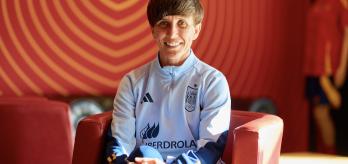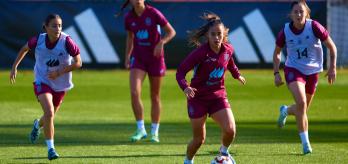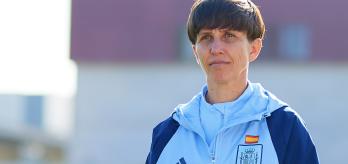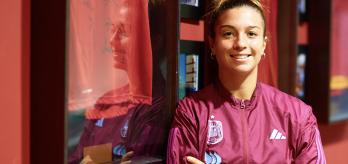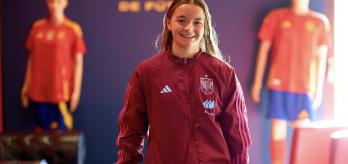At the tender age of four, Ortega, who was born into a family of footballing stock, took her first kicks of a football, and it wasn’t long before she fell in love with the game, spending every playtime honing her skills alongside her male classmates and starring for the school team. When she was 14, Athletic Club came calling, and the Logroño-born sharpshooter made the move to Bilbao to follow her dreams. In this four-part interview, Ortega recounts her journey from those early days to her status as a national-team star, underscoring the support that she has received along the way and the importance of working hard and preparing in the right way.
In this interview, we will explore different factors such as elements of her personal background and social environment that shaped her journey. Additionally, we will discuss how her early experiences guided her path in unexpected ways.
Key points
-
Ortega was inspired to play football by family members, who remain her biggest cheerleaders to this day.
-
Hard work and dedication have paid off for the up-and-coming ace, who grew up playing with boys and competing in judo.
-
The La Rioja native combines impressive technical and tactical ability with an excellent off-pitch regime, with sacrifices being part and parcel of making the grade as a professional footballer.
Watch interview
Read summary
Part 1: First steps in the game
Ortega recalls how her love affair with football began when she was just four. Raised in a family of footballers – her uncles played in the Spanish top flight and her father lined up for a number of clubs across La Rioja – it was little coincidence that young Sara developed an affinity for the game. Far from being deterred by being the only girl amongst the boys, she spent every playtime kicking a ball around. Ortega’s family were fully supportive of her interest in football. Indeed, when she told her parents that she wanted to play the game, Ortega’s father took her along to a local team and told her that he would support her if it is what she wanted to do. Ortega soon realised that football was the game for her but that she preferred playing with her school friends, and her parents promptly signed her up for the school team.
Part 2: Transition to organised football
Like many children, Ortega grew up playing football on the playground, where there were no rules, and she played purely for enjoyment. She believes that having played primarily with boys greatly fast-tracked her development. Ortega played for the love of the game and never imagined that she would go on to represent her country. When she joined Athletic Club, she found the standard just as demanding as when she competed with boys, with the one difference being that she was now involved in a league competition. She remains indebted to the Bilbao-based outfit for the opportunity that they handed her at the age of 14. The Rioja-born sensation remembers the support she received from the club right from day one and recalls being surprised at the lengths to which the staff were willing to go to ensure that she was happy and could focus on doing what she enjoys most.
Part 3: Styles of play and other sports
Ortega recognises how fortunate she was to have played under two coaches in her early days who sought to instil a possession-based game in their charges. She would later encounter that same playing style at Athletic Club’s Lezama training ground, where the emphasis is placed on the quality of a player’s first touch and their ability to link up with team-mates. However, Ortega is quick to stress that there is more to the modern game than combination play, with transitions occupying an increasingly prominent role. During her childhood, Ortega played football and practised judo. Despite enjoying both sports, when events across the two began to clash, she soon decided to drop judo and focus on the beautiful game. The forward comments that she is happy with her decision but is glad to have competed in both an individual and a team sport.
Part 4: Inspirational figures and going professional
The FIFA U-17 Women’s World Cup India 2022™ winner closes the interview by discussing her transition to the professional game and those who inspired her on her journey. As she progressed up the ranks with Las Leones, Ortega noticed some changes in terms of the off-pitch routine, including the expectation that players spend time in the gym before and after training. When Ortega made the step up to the Athletic Club first team, nutrition, rest and sacrifices became a big part of her life. She admits that being a footballer means sometimes missing out on social events with family and friends, which she says is a sacrifice that is worth making. With regard to inspirational figures, Ortega lists her father, who always encouraged her to just enjoy herself; her first two club coaches, who instilled a strong worth ethic; and her current tactician at Athletic Club, Iraia Iturregi, who placed her faith in her, handing her debuts for both the club’s reserve and first teams.





